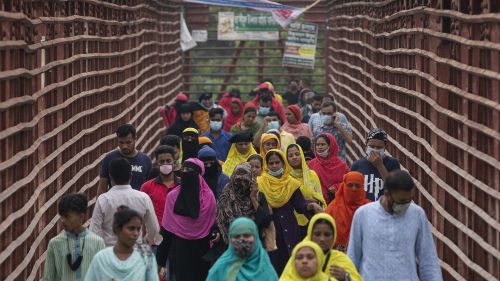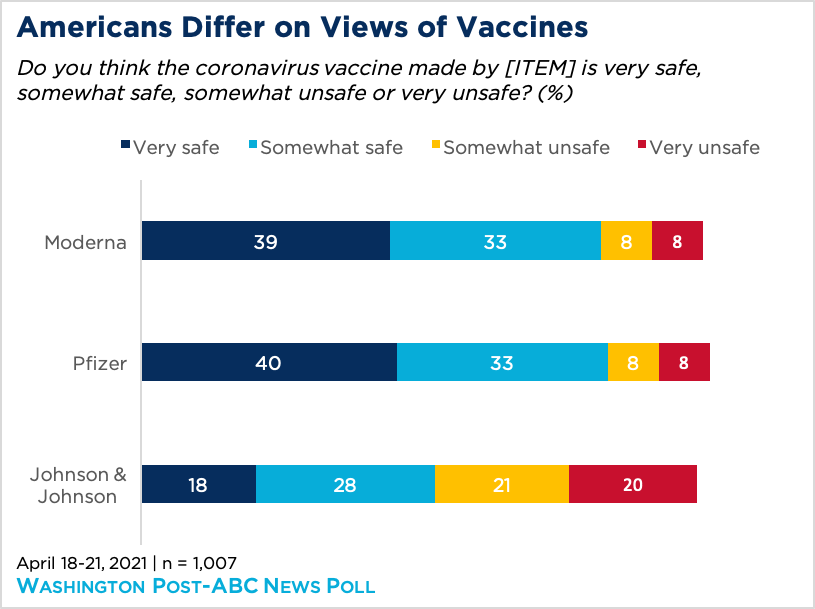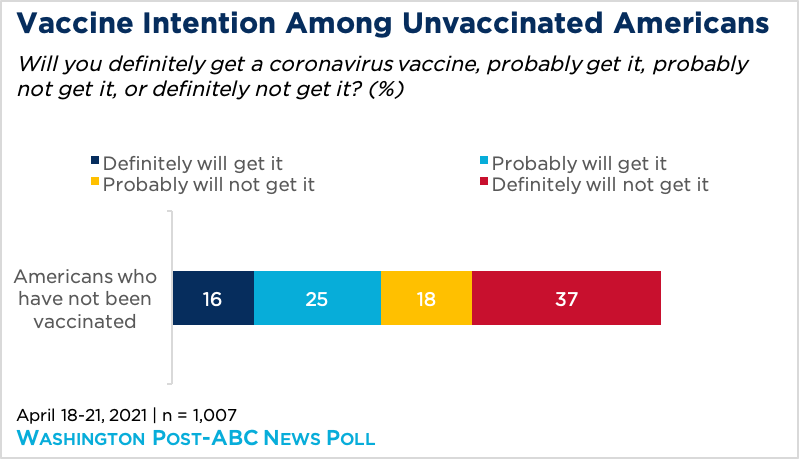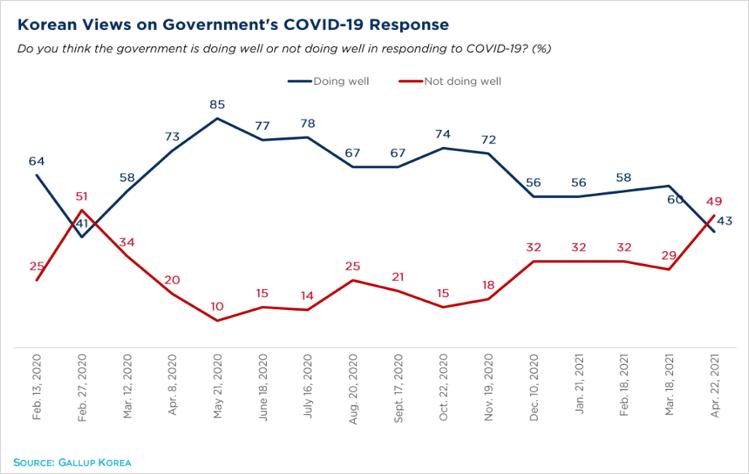Amid Surges and Vaccine Issues, Global Public Opinion Shows Crisis is not Over

Following high profile pauses to the AstraZeneca and Johnson & Johnson vaccines, as well as surging cases in different parts of the world, it is clear that the gains in some countries do not signal an end to the pandemic.
This week the world passed the 148.3 million case mark, with over 3.1 million deaths attributed to COVID-19. As cases rise precipitously in India and the situation in Brazil remains bleak, the inequalities of global health have come into the spotlight. Despite efforts among the United States, Russia, and China to provide vaccines to countries that need them, some fear that these actions are not enough.
For this week’s COVID-19 update, the Chicago Council Survey team looks at polling results from the United States, Japan, South Korea, France, the United Kingdom, and India.
Key Findings
- While the CDC has lifted the pause on the J&J vaccine, a quarter of those Americans who haven’t been vaccinated (24%) say that the pause made them less inclined to get vaccinated.
- As Japan declares its third state of emergency, 68 percent of Japanese believe that the stricter measures are reasonable.
- For the first time since February of 2020, a plurality of South Koreans (49%) say that their government is not doing well in responding to COVID-19.
- Nearly eight in 10 French people (77%) support a regional-based re-opening as the country looks to relax restrictions from its third national lockdown.
- A majority of British people (51%) expect the economic situation in the UK to get better over the next year, the first time a majority of Britons have said so since 2014 and an indication of the declining crisis in Britain.
- With cases surging severely in India, the proportion of Indians who say that the COVID situation is improving in their country has dropped to 28 percent on April 18 from 75 percent on March 7.
The United States
32.2 million cases, 573,000 deaths
Despite the brief pause of the Johnson & Johnson (J&J) vaccine, the United States’ vaccine campaign is back on track. President Biden has committed to sending 60 million AstraZeneca doses to countries in need of vaccines, though this move has criticized due to these vaccines being manufactured at the troubled Baltimore plant. Moreover, some say that 60 million is not enough considering the devolving public health situation in nations like Brazil and India.
Although the CDC lifted its pause on the use of the J&J vaccine on April 25, it appears that the damage has been done. An April 18-21 Washington Post/ABC News poll found that when asked about the safety of various vaccines, Americans were significantly less likely to say that the J&J vaccine is safe (46%) compared to Moderna (71%) and Pfizer (73%).

While 74 percent of those who haven’t already been vaccinated say that the J&J pause makes no difference to their intention to get vaccinated, a quarter of unvaccinated people (24%) say they are less inclined to get inoculated. But, 73 percent of unvaccinated people say they are not willing to get the J&J vaccine, even if it were put back in use.
Perhaps more troubling: more than half of people who haven’t gotten the vaccine yet (55%) say that they probably (18%) or definitely (37%) will not get the vaccine. As the United States tries to achieve herd immunity, the unwillingness of the remaining unvaccinated Americans to be vaccinated may prove to be a significant roadblock in exiting this crisis.

Japan
576,870 cases, 10,031 deaths
With just a few months before Tokyo hosts the Summer Olympics, Japan declared its third state of emergency due to the pandemic. While the emergency measures stop short of a full lockdown, the government imposed new restrictions on restaurants and other businesses in Tokyo, Osaka, Kyoto, and Hyogo prefectures and are set to be in effect until at least May 11.
NHK polling conducted in April finds approval for the new restrictions. A majority of Japanese (68%) think the stricter measures taken by the third state of emergency are reasonable, compared to a minority who do not think so (27%).
In terms of its vaccine rollout, Japan continues to lag behind much of the developed world. As of April 25, less than two percent of Japan’s population has received at least one vaccine dose. In order to combat the slow distribution, the government is considering operating large-scale COVID-19 vaccination centers capable of administering shots to 10,000 people per day, which will be separate from vaccination facilities operated by local governments.
Given that a minority of Japanese respondents (16%) currently think the government’s vaccination plan against the coronavirus is going well, public opinion indicates that the operation of these new centers will be met with high approval. And if Japan can increase its supply and distribution of COVID jabs, TBS/JNN polling conducted April 3-4 suggests that it will be met with high demand due to a majority of Japanese (71%) saying they want to get vaccinated.
South Korea
120,673 cases, 1,821 deaths
On April 28, South Korea reported 775 new cases and last Friday there were 797—the highest number since January. Amid concerns over a fourth wave of infections, around 5 percent of the population have received their first shot. The government's decision to rely mostly on COVID-19 Vaccines Global Access (COVAX) is hurting its inoculation campaign, making it unclear whether Korea will reach herd immunity by November as planned. An April 20-22 survey by Gallup Korea finds approval of the government’s handling of COVID-19 is net negative for the first time since February 2020 when a mass infection broke out in Daegu.

Growing frustration with the government’s handling of COVID-19—as well as scandals involving government officials and real estate holdings—are now having political effects. Opposition candidates won April 7 mayoral by-elections in Seoul and Busan—South Korea’s two largest cities. This marked a major shift from 2020 legislative elections when President Moon’s success in managing COVID-19 propelled the ruling party to a landslide victory.
The mayor of Seoul is generally considered to be the second most powerful elected post in the country behind the president, and Oh Se-Hun’s election may prove problematic for President Moon. This is Mr. Oh’s second stint as mayor of Seoul, and he has already called for extended business hours and use of self-diagnostic kits. These proposals may prove popular among a population growing tired of the continued restrictions proposed by the ruling party in efforts to help contain the virus.
On April 11, Korea decided to continue using the AstraZeneca vaccine for all eligible people over 30 years of age. Previously, AstraZeneca vaccinations were suspended over concerns of blood clotting. Even though reports of severe side effects continue, majorities (77%) are willing to get vaccinated according to an April 18-19 poll by the Korean Broadcasting System and Hankook Research.
More recently, the administration signed an agreement with Pfizer for 40 million doses. The president also ordered a review of Sputnik V which majorities (51%) say is needed according to an April 23 Realmeter survey. Successful vaccinations will now depend on a timely delivery amid global competition and virus mutations.
France
5.59 million cases, 103,762 deaths
Now four months into their third national lockdown, cases have slowed but remain elevated from December. However, talk of reopening is gaining momentum, and schools reopened on Monday, April 26; a move which President Emmanuel Macron has hailed as combatting social inequality. Macron has also said that he wants to push back the 7pm curfew, saying that it’s “a little early.”
Despite plans to start reopening on May 3, the French aren’t sure these plans will come to fruition. An April 22-23 Odoxa poll found that although 72 percent wish the ‘deconfinement’ efforts begin on May 3, just 45 percent think they actually will begin at that point. However, a suggestion from the minister of health that regions less touched by the virus could begin reopening efforts sooner is popular among the French; nearly eight in 10 (77%) favor a regional-based re-opening.
Perhaps as a result of these plans for a relatively quick reopening effort, many French do not express concerns about employment. According to an April 14-15 Odoxa survey, nearly eight in 10 (77%) say they do not think they could lose their job in the coming months and 64 percent say the switch to remote work has gone well. But French people are more split on the future of their personal finances more broadly. Just 45 percent say they are confident in their economic situation over the next 6 months while 54 percent are not confident.
The United Kingdom
4.4 million cases, 127,451 deaths
The United Kingdom appears to be at the cusp of conquering the virus as they reported just 2,064 cases and 6 deaths on April 26. Compared to three months ago when they were averaging around 50,000 cases and 1,500 deaths per day, the success of their restrictive measures and vaccine campaign are apparent.
or Britons, the diminishing impact of the virus is leading to a much more optimistic public mood. According to an April 16-22 Ipsos MORI survey, 51 percent of British people expect the general economic condition to improve over the next year, the highest percentage of Britons who have said so since mid-2014. Just over a third (36%) expect it to get worse.
Despite the current success in containing the virus, British people are split on whether their government and officials did a good or bad job. While 45 percent said the government or Boris Johnson (42%) did fairly well handling the pandemic, a similar amount said they did a bad job (45% the government, 46% Boris Johnson). Britons do, however, say that Rishi Sunak, the Chancellor of the Exchequer, did very or fairly well (59%).
Even with a divided view of Johnson’s actions as Prime Minister during the COVID-19 crisis, he currently enjoys an approval rating of 43 percent, while 34 percent disapprove and 20 percent neither approve nor disapprove. Though only a plurality approve of Johnson, 55 percent say they could see themselves voting for the Conservative Party under Boris Johnson. Though the next general elections are not until 2024, it appears that the Conservative government’s ultimate success during the COVID-19 pandemic could have long-term implications for UK politics.
India
17.6 million cases, 197,894 deaths
Just six weeks ago, India’s Health Minister declared the country was “in the endgame” of the COVID-19 pandemic. In March, however, India experienced a devasting second wave that is still escalating. The country recorded more than a million new cases in just three days, setting world records for new daily infections, and is running short on key medical supplies. At the same time, India’s COVID-19 vaccine campaign has slowed. Less than 10 percent of Indians have gotten even one dose, despite India being the world’s leading vaccine manufacturer.
Public opinion in India reflects an increased concern towards the virus that has accompanied the surge. According to the Ipsos “What Worries the World” survey, COVID-19 reemerged in April as the number one ranked worry for almost half of Indians (45%). This is a significant increase from February, when roughly a third of Indians (34%) labeled the virus a top concern.
The perceived national outlook for the pandemic has also shifted in recent weeks. When India’s “endgame” was announced on March 7, three in four Indians (75%) said they think the coronavirus situation is getting better in their country. On April 18, the number of respondents who said the same had decreased to just over one in four (28%), as reported by a YouGov COVID-19 tracker.



